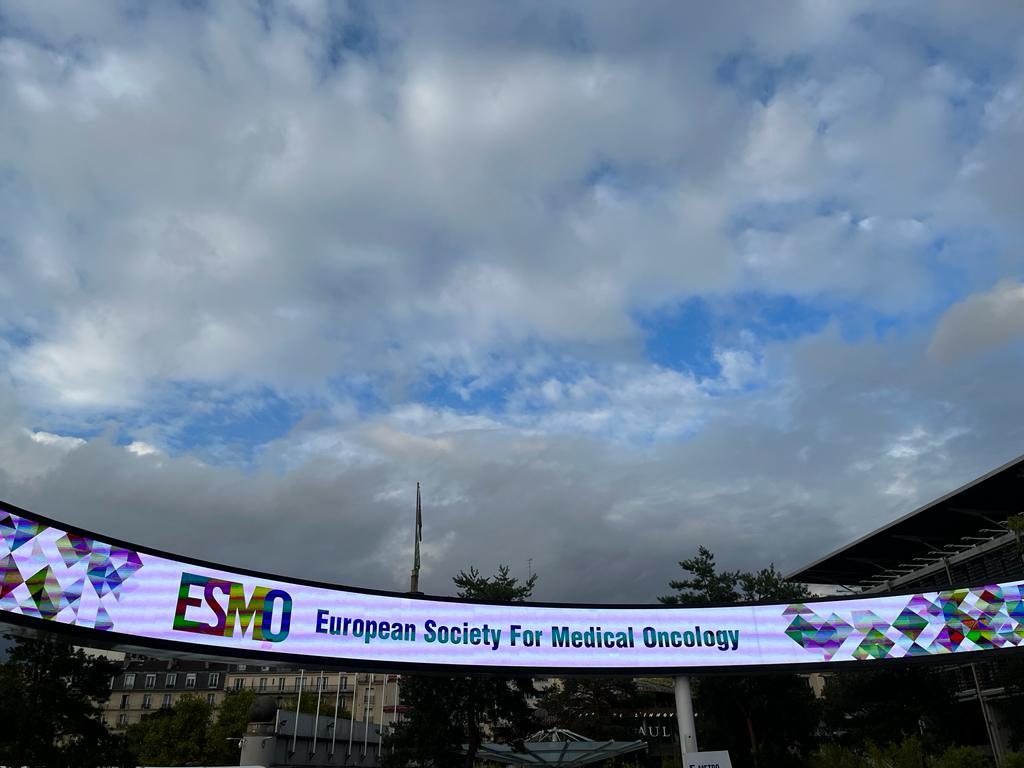By Yuva Oz, Business Development Manager at Oncode Institute
“For the first time in 3 years experiencing a jet-lag, I am excited to get back to an amazing face to face meeting with enthusiastic colleagues from all over the world” are the words of Dr. Vivek Subbiah, Medical Director of the Clinical Center for Targeted Therapy at MD Anderson, who perfectly summarized the ambiance of ESMO 2022. The first live gathering of the ESMO Congress in Paris since 2020. Our Oncode valorization team and some of the Oncode Investigators were there too!

Some of this year’s congress’ highlights were the validation studies of Tumor Infiltrating Lymphocyte (TIL) therapy in melanoma, the promise of neoadjuvant immunotherapy in CRC - both presented by fantastic Dutch research teams including Oncode Investigator Ton Schumacher, Emile Voest as well as the multiple studies on potential of antibody drug conjugates as a treatment option in advanced solid tumors.
In the first presidential Symposium, Dutch oncologist Prof. John Haanen from the NKI-AVL presented the positive results from the Phase III trial of adoptive cell therapy using TILs in patients with melanoma, establishing the validation of TIL therapy in this indication with a potential applicability to other solid tumors. The data demonstrated the significantly longer progression free survival (PFS) upon TIL therapy over standard of care immunotherapy (ipilimumab, anti-CTLA-4, BMS) in patients with advanced or refractory melanoma. In a deep dive keynote lecture given by Oncode Investigator Prof. Ton Schumacher and Prof. John Haanen, further optimization of TIL therapy and future directions were discussed. At the horizon, next generation TIL therapy may involve the transfer of tumour antigen specific receptors to increase TILs’ fitness by genetic modification. TIL therapy is not yet approved, but the results presented at ESMO 2022 might change the opinion of regulatory bodies.

In the second presidential symposium, results of NICHE-2 trial and the unprecedent water-plot data of responders (95% of patients achieving qPCR) received an ecstatic applause of thousands of claps. Presented by Dr. Myriam Chalabi from NKI-AVL, the Dutch team showed the effectiveness of neoadjuvant immunotherapy in patients with mismatch repair-deficient (dMMR) colon cancer, indicating the feasibility of the approach, and paving the way for a larger trial for watch and wait approach.
Further on, Prof. Siow Ming Lee from University College London (UK), presented the IPSOS study - a Phase III study of first line atezolizumab (anti-PDL1, Roche) versus single agent chemo in patients ineligible for treatment with doublet chemotherapy regimen. This study revealed overall survival benefit in NSCLC, bringing Roche an opportunity for PD-L1 inhibition in an untapped population.
These are not the only interesting and relevant data presented. Encouraging data from late-stage breast cancer, updated results from the Phase III TROPICS-02 trial with sacituzimab govitecan (TROP2 ADC, Daichii Sankyo), demonstrated significant overall survival in endocrine resistant, heavily treated HR+/HER- metastatic breast cancer (mBC) compared to chemo. Presented by Prof. Hope Rugo at University of California San Francisco (US), the results potentially establish SG as a new treatment option.
Besides this, results from three Phase III studies were sobering for immunotherapy in Renal Cell carcinoma missing the primary endpoints. IMmotion10, CheckMate 914, PROPSPER did not improve disease free survival. Robert J. Motzer, US, presenting the results from the CheckMate 914 trial commented there might be opportunities within neoadjuvant setting since the safety was within expected levels. The question remains why RCC is so immune therapy resistant?
Another topic of interest was how glioblastoma is one of the most difficult indications with no new treatments developed for the last 20 years. Immuno-suppressive environment of the brain made PD1/PDL1 treatments unsuccessful so far in this patient population. The study from Mirallas et al investigated NGS for identifying actionable mutations in newly diagnosed GBM. Strikingly molecular alterations that can benefit from targeted treatment was found in 70% of the patients including EGFR, PTEN, CDKN2A. However, only 2% of these patients can be treated using NGS to identify with existing drugs, indicating a future potential to these patients. Let us mention here the last year’s Oncode Clinical Proof of Concept funded GLoW study by Prof. Edwin Cuppen for maximizing treatment options for recurrent glioblastoma patients by whole genome sequencing-based diagnostics is currently ongoing in parallel to these developments.
And the event couldn’t miss what is new in IO: Biontech’s Phase I study evaluated the safety and efficacy of CARVac CAR T cell Amplifying RNA vaccine. BNT211-01 or CLDN6 CART cells and CLDN6 encoding mRNA vaccine is designed to improve intra-tumoural immune infiltration, cancer cell recognition and target the inhibitory Tumour microenvironment with using sufficient neo antigens. Study results indicated CARVac drives the expansion of CAR-T cells, with best overall response being 1 Complete Response, ORR 33% within a small study of 21 all comers patients.
Last but not the least, a large proportion of the congress’ focus was particularly on diagnostic, prognostic and treatment guiding biomarkers. “I have biomarker anxiety” said Dr. Ana Bosch from Sweden Lund University. "With the evolving complex scene of targeted treatments, associated biomarkers play a critical role in the choice of treatment for cancer patients. There is a need for awareness among oncologists and researcher community for the utilization of both well-known and less well-known biomarkers”. Don’t be shy, order the molecular screening test for your patients recommends the ESMO committee!
